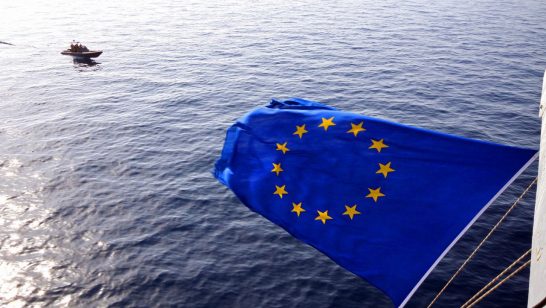
EU founding father Jean Monnet famously remarked that “Europe would be built through crises.” As the most severe geopolitical crisis to hit the continent in decades, Russia’s invasion of Ukraine could accelerate European integration, leading to a wider, deeper and more influential European Union. Crisis, however, may both create and destroy. To harness their newfound integrative momentum, member states must remain united, finding innovative solutions to obstacles along the road ahead.
The current crisis so far provides cause for optimism. Following the invasion, EU member states quickly agreed on a strong response including unprecedented sanctions and common financing of military aid. While the energy shock has imposed mounting costs on citizens, cohesion has largely held. The EU has proactively sought to mitigate this potential source of division, agreeing on funding for accelerated renewable energy deployment, targets for reduced energy use, and a price cap for natural gas. Taken together, these actions suggest both recognition of the high stakes of the war and a concerted effort to maintain unity.
The invasion has also resuscitated the EU enlargement process. Long stagnant, it now commands greater attention as the Union seeks to fill geopolitical vacuums in its neighbourhood. In Eastern Europe, Brussels has abandoned its former policy of strategic ambiguity vis-à-vis Russia, promising eventual accession to Ukraine, Moldova and Georgia. In the Western Balkans—where fears of Russian and Chinese influence are rising—the EU has demonstrated renewed commitment by opening accession negotiations with North Macedonia and Albania as well as granting candidate status to Bosnia-Herzegovina. Brussels has also taken more immediate steps to enhance integration such as investments in regional energy infrastructure, inclusion of the Western Balkan states in EU educational initiatives, and visa liberalisation for Kosovo.
Nonetheless, daunting challenges remain for enlargement. All candidate countries require significant political and economic reforms before they are prepared for full membership. Ongoing backsliding in certain newer member states such as Hungary and Poland, which has threatened the Union’s cohesion and legitimacy as a community of values, will make the EU especially wary of rushing accession processes. In the case of particularly difficult candidate countries—Turkey and Serbia come to mind—accession may even require a change in leadership to get back on track.
To balance the necessities of ensuring robust reform in prospective members and sustaining the momentum of enlargement, Brussels should offer carrots along the way. A phased approach to enlargement could include progressive participation in EU economic, energy, and security frameworks along with political representation in key strategic forums. While the European Political Community initiated by French President Macron offers opportunities for enhanced cooperation, its very broad membership beyond countries explicitly seeking to join the EU and shallow institutionalisation limit the format’s utility for advancing the enlargement process. By contrast, a preparatory EU membership status would keep the focus squarely on the goal of accession, steadily advancing integration between EU institutions and prospective new member states. Offering more tangible benefits of accession prior to full membership will both keep candidate countries motivated to continue reforms and allow for a more gradual adjustment to a wider Union.
Offering more tangible benefits of accession prior to full membership will both keep candidate countries motivated to continue reforms and allow for a more gradual adjustment to a wider Union. Nicholas Lokker
The European Union’s renewed push toward territorial integration has in turn advanced its institutional reform agenda. Contrary to the prevailing assumption, there is no necessary trade-off between widening and deepening. In various cases over the years, enlargement has prompted greater sovereignty-sharing by demonstrating the necessity of institutional change. Calls from many EU leaders for reform to accompany further expansion demonstrate that such a mechanism is at work today.
These demands stem largely from worries that an enlarged EU would become unwieldy. A particularly salient concern is the current requirement for unanimous decision-making in certain key policy areas. Last August, Olaf Scholz notably proposed introducing majority voting for foreign policy, in a speech billed as the German response to Emmanuel Macron’s ambitious EU reform agenda outlined at the Sorbonne in 2017. Such a change could greatly enhance the EU’s effectiveness as a geopolitical actor, preventing rogue capitals from derailing decisions on sanctions, political statements or arms embargoes (as has occurred dozens of times in recent years).
An aligned Franco-German axis, however, is a necessary but insufficient condition for advancing European integration. Expanded majority voting currently lacks the required unanimous consensus, making creative compromises essential. Poland, as the largest skeptic of majority voting, has a crucial role to play and must be a special focus of outreach. Underpinning Warsaw’s opposition is the fear of having its voice drowned out by Berlin and Paris, who will find it difficult to rebuild trust following years of misguided Russia policy. However, the ardently pro-enlargement stance of Poland (as well as other member states wary of reform) presents a deal to be struck: support for majority voting in exchange for phased EU accession that more quickly delivers benefits to candidate countries. A commitment to regular high-level trilateral consultations between France, Germany and Poland through the underutilised Weimar Triangle format could help rebuild confidence and set the stage for negotiations in this direction.
...the ardently pro-enlargement stance of Poland presents a deal to be struck: support for majority voting in exchange for phased EU accession that more quickly delivers benefits to candidate countries. Nicholas Lokker
Such an agreement would pave the way for a genuine geopolitical transformation. Effective incorporation of its neighbours would allow the bloc to increase its collective weight in the global arena, while EU foreign policy would become nimbler through the abolition of individual vetoes. Both dimensions of integration are essential if the EU wishes to deliver on its stated ambitions of becoming a more influential player on the world stage.
There is no guarantee of success. Much depends on whether member states can stick together in the face of war on the European continent, finding creative solutions that occupy the common ground between their respective interests. Yet it is never wise to waste a good crisis.
The opinions articulated above represent the views of the author and do not necessarily reflect the position of the European Leadership Network or all of its members. The ELN’s aim is to encourage debates that will help develop Europe’s capacity to address the pressing foreign, defence, and security policy challenges of our time.
Image: Wikimedia Commons / DAVID ILIFF. License: CC BY-SA 3.0



